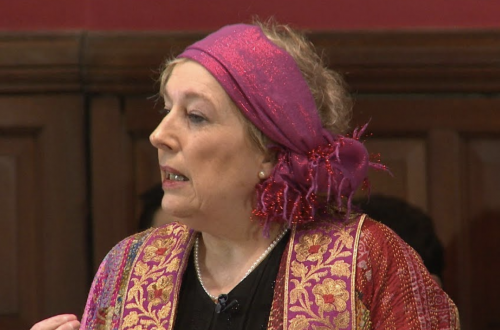“There is a concatenation of all events in the best of possible worlds; for, in short, had you not been kicked out of a fine castle for the love of Miss Cunegund; had you not been put into the Inquisition; had you not traveled over America on foot; had you not run the Baron through the body; and had you not lost all your sheep, which you brought from the good country of El Dorado, you would not have been here to eat preserved citrons and pistachio nuts.”
“Excellently observed,” answered Candide; “but let us cultivate our garden.”
Candide, Voltaire
–
EAPPI is an ecumenical Christian organisation which happily promotes antisemites and their theology, and criticises Israel ostensibly because it thinks that Jews do not listen to their own prophets.
The Church of England recently voted to endorse and promote EAPPI, to the dismay of British Jews and their representative body, the Board of Deputies.
The Jewish Chronicle reports:
But Philip Rosenberg, who left the Board last year, said this week that the “unnecessarily harsh” response “risks endangering our relationship” with the Church.
This was the reaction of Edward Kessler:
Edward Kessler, executive director of the Woolf Institute in Cambridge, believes the “over-the-top reaction” from the Board “was generated by a failure to cultivate relations with the appropriate people within the Church. It has set back Church of England-Jewish relations.”
The Woolf Institute “studies relations between Jews, Christians and Muslims“. Kessler has written many books on Jewish-Christian relations.
Kessler’s reaction is quite stunning. He is supposedly an expert on Jewish-Christian relations. With no criticism of the EAPPI decision from the C of E, nor the antisemitism that accompanied the C of E’s discussion on EAPPI, Kessler is uniquely upset with the BOD for their “over-reaction.”
Rather than acknowledging that they were understandably upset, Kessler puts the blame on Jews within the BOD for not having schmoozed the right people in the first place!
But you have to marvel at Philip Rosenberg’s suggestion that the BOD “risks endangering [the Jewish] relationship” with the Church of England. There is no relationship, so Rosenberg’s words sound as foolish as the Temple Official’s words in The Life of Brian.
Meanwhile, the Council of Christians and Jews and the supposedly sympathetic Bishop of Manchester, ended up blaming Jews for the anti-Jewish outcome of the EAPPI vote:
“A few people said that all the lobbying from the Jewish side led us to vote the other way,” said the Rt. Revd. Nigel McCulloch, who is chair of the Council of Christians and Jews (CCJ), the UK’s oldest Jewish-Christian interfaith group. “There was over-lobbying by some members of the Jewish community. The CCJ actually warned against this, as we know how the Synod works and it’s not a good way to get things done.”
The bishop also shared his expertise on antisemitism:
The debate also, however, included at least one reference to a “powerful lobby,” which some Jewish observers interpreted as having anti-Semitic overtones. Bishop McCulloch rejects the suggestion.
Yet the EAPPI decision was not a sudden one, and there was nothing that Jews, or the Board of Deputies, could have done to prevent the Anglican Church from passing it. According to the Church of England website, its bishops have been linked with EAPPI for a decade:
What are EAPPI ‘s relations with the Church of England?
Since its establishment in 2002 the Church of England has offered its support to the EAPPI programme through its membership of ecumenical instruments such as the WCC, CTBI and Christian Aid. This complements the direct support provided by agencies like USPG and CMS. Several bishops have also provided direct support by meeting with EAs and by circulating vacancy notices in diocesan publications. Parishes and Church of England schools have also provided platforms for EAs to share their reflections. In 2012 the General Synod passed a motion “encouraging parishioners to volunteer for the programme and asking churches and synods to make use of the experience of returning participants.”
When debating EAPPI, this is the context of what happened at Synod:
- Many clergy complained about Jewish lobbying, Jewish power, Jewish names, and Jewish money.
- The proposer of the motion John Dinnen claimed that a Jewish A4 leaflet against EAPPI must have cost £1000.
- Jewish convert to Anglicanism Paul Oestreicher invoked the memory of his grandmother, in order to claim that she would be ashamed of Jewish opposition to EAPPI.
- The Archbishop of Canterbury compared the Holocaust to Israel’s security procedures at checkpoints.
Here is some of the wider context about Jews and Anglicans:
- N.T. Wright, the most widely read Anglican theologian of today, and Bishop of Durham until 2010, has promoted the idea that Jews have a “blood and soil” identity (borrowing from Nazi terminology). He has re-interpreted the Galatian heresy to suggest that Jews are “the dogs, the evil workers, the mutilation people”. He has claimed that Jews used the Holocaust to come into Palestine “on a moral high ground”, and decried “plane-loads” of American Jews “fired up with synagogue sermons” who make aliyah. He decries Christian Zionism as a “return to some quasi-Jewish theology of ‘sacred turf”. N.T. Wright has not been criticised for this by Anglican clergy.
- Stephen Sizer has gone undisciplined and uncriticised by the Church. Sizer endorses a campaign of antisemites protesting outside synagogues. He has a long history of recommending the writings of Holocaust deniers, citing Holocaust deniers in his academic work, accepting speaking invitations from Holocaust deniers, and sharing platforms with Holocaust deniers to denounce the Jewish state. He also thinks that Libyan dictator Colonel Gaddafi was tied to the USA by Jewish blood, which apparently rendered the Americans reluctant to stop Gaddafi’s murders. He also thinks it commendable to call for Jews to “get the hell out of Palestine“. He meets with Islamists in Hezbollah and in the Iranian government, who seek the destruction of the Jewish state.
- Sizer is defended by his Bishop, the Bishop of Guildford Christopher Hill, and the Diocese of Guildford in general. He also appears to be protected by the leadership of William Taylor of St. Helen’s Bishopsgate, as a partner in the South East Gospel Partnership.
- The Friends of Sabeel UK organisation is an anti-Israel group, whose patrons include supporters of Hamas and Hezbollah such as Ibrahim Hewitt and Manuel Hassassian, and also the Bishop of Exeter Michael Langrish, and the Bishop of Chelmsford John Gladwin. One FOSUK speaker has claimed that Hamas are being “crucified” by Israel. FOSUK also happen to share an office with the Church Mission Society, which is the mission wing of the Church of England.
Faced with all this, I cannot see how there can be any relationship between the Church of England and the Board of Deputies.
Unless they wish to carry on planting trees.



